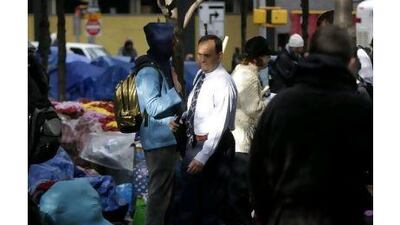NEW YORK // Almost 90 minutes into his commute from the New Jersey suburbs, Michael Devaney has nearly reached his job on Wall Street. But first he threads through a sea of occupied sleeping bags, around protesters crawling from under plastic tarps in search of cigarettes and coffee, and past a sign on a pole protruding from a suitcase.
"Billionaires," it warns, "Your Time is Up!"
It is 7.45am, and another day in the capital of capitalism has begun.
The scene has been repeated now for most of three weeks, as the regular workers of Wall Street arrive to meet protesters demanding an end to the financial system as Americans know it.
The bankers, lawyers and others climbing from the subways, briefcases in hand, seem largely unperturbed - sympathetic, even - to those who call them the enemy.
Mostly, though, as the protest spreads from a Manhattan park to cities around the United States, Wall Streeters sound confused.
What exactly, they ask, do the protesters want?
"They definitely have a right to be here, but they don't seem to have a goal. What is it, to put Wall Street people in jail?" Mr Devaney, who works in information technology at one of the financial district's many banks, said on Tuesday.
Mr Devaney's uncertainty about the protesters' message was echoed by some of the protesters.
The Occupy Wall Street protests, which began on September 17, have spread this week from Los Angeles to Chicago and other cities. Protesters have spoken out about the nation's lack of jobs, blaming Barack Obama and members of Congress. They have criticised corporate lobbyists and employers.
But they have reserved most of their criticism for Wall Street. On Monday, when protesters dressed as corporate zombies marched past the New York Stock Exchange clutching fistfuls of money, some bystanders shouted: "Get a job!" But others smiled at the street theatre.
Gary McFelia, a technology consultant, said: "It's nice to see that people can come here and say what's on their mind. People can't do that in a lot of countries." said.
Many of those who work in the fabled centre of US commerce said they did not take the protests personally. Some even sympathised.
Lou Crossin, who works for a company that sells corporate governance research to large investors, said: "It's really incredible to me, the passion and conviction these people have. I don't think these are violent people. They're just standing up for their beliefs."
Mr Crossin said the protesters, with their chanting in unison, leafleting and drum circles, reminded him of the lyrics of a song from his youth by Jefferson Airplane: "Look what's happening out in the streets. Got a revolution."
He was not the only one to feel that way. Sam Schmidt, a criminal defence lawyer who walks by the park every day, said the protests took him back to when he was a college student in 1970 and went to Washington to oppose the war in Vietnam.
"I lived through the '60s and the '70s, and this is nothing. I think it is well-behaved. We've got a few crazies, but we have a few crazies here anyway," he said. "It's just reminiscent of my youth."
Others said the protesters were misguided. Talley Leger, a former strategist at Barclays Capital, said he understands the anger of the protesters. But by lashing out at Wall Street as if it were a monolith, people were oversimplifying things.
"I'm not defending bankers: I got laid off from one," Mr Leger said, but he added that there is plenty of blame to go around. "Why did people take on so much debt when they knew they weren't going to be able to pay it back?"
Just 9 metres away, the protester Tammy Bick stood wearing a sign around her neck. "My generation will never be able to retire," it read. "All of our [retirement] funds were stolen from us by Wall Street & their manipulations."
But Ms Bick, 49, from Connecticut, who said she was fired from her job last November as a secretary at an HIV clinic, smiled warmly as people slowed to read her sign. The protests have provided a platform for an exchange of ideas, she said.
"They still don't take us seriously. I think they think it's just a little movement that's going to go away," said Ms Bick, who plans to help launch protests in Connecticut. "The only way to do it is to show them, to make them open their eyes."

